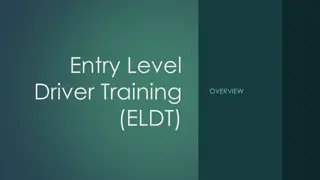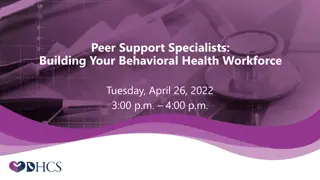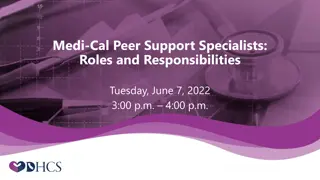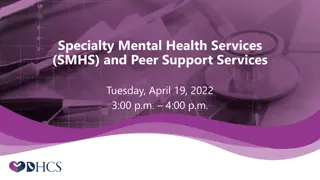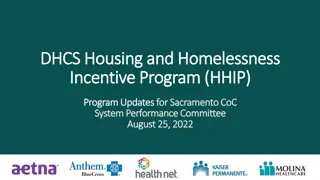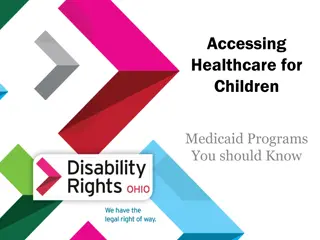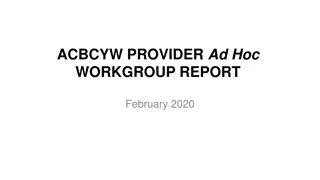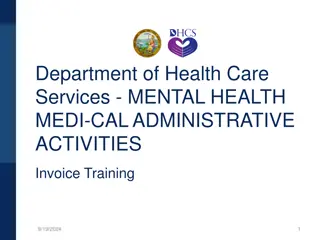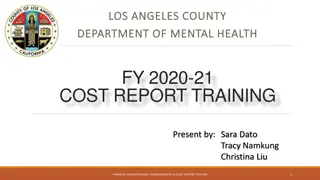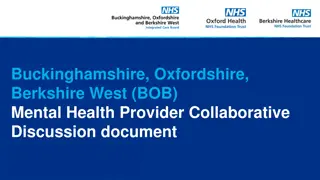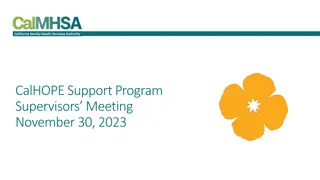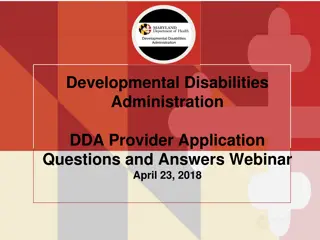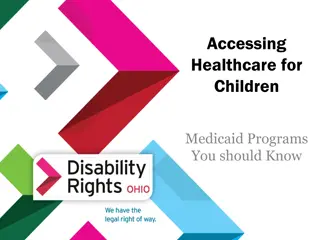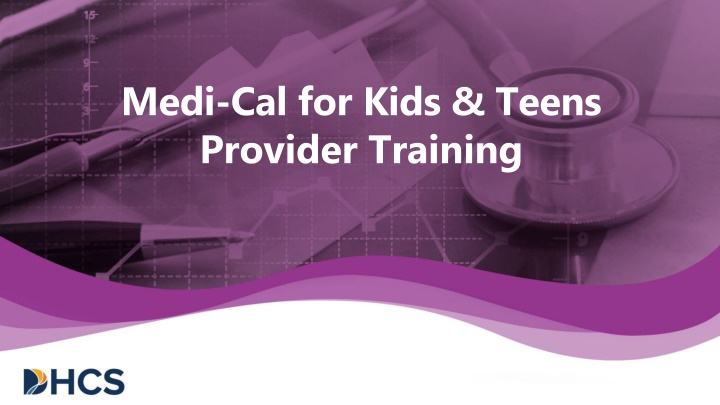
Understanding Medi-Cal for Kids & Teens Provider Training
Explore the comprehensive training program for healthcare providers to enhance their knowledge of Medi-Cal for children and teens, ensuring access to vital healthcare services. Learn about the program's modules, goals, and the importance of preventive services for Medi-Cal-enrolled youth.
Download Presentation

Please find below an Image/Link to download the presentation.
The content on the website is provided AS IS for your information and personal use only. It may not be sold, licensed, or shared on other websites without obtaining consent from the author. If you encounter any issues during the download, it is possible that the publisher has removed the file from their server.
You are allowed to download the files provided on this website for personal or commercial use, subject to the condition that they are used lawfully. All files are the property of their respective owners.
The content on the website is provided AS IS for your information and personal use only. It may not be sold, licensed, or shared on other websites without obtaining consent from the author.
E N D
Presentation Transcript
Medi-Cal for Kids & Teens Provider Training
Todays Training Goals & Purpose of Today s Training Training Modules > Module 1: What is Medi-Cal for Kids & Teens and How Does it Work? > Module 2: Deep Dive into Behavioral Health Services, California Children s Services Program, and Skilled Nursing Services 2
Federal law enacted in 1967 established Early and Periodic Screening, Diagnostic and Treatment (EPSDT), which guarantees all medically necessary services to children and youth under age 21 enrolled in Medi-Cal. As of 2023, California refers to EPSDT as Medi-Cal for Kids & Teens 3
Millions of Children in Medi-Cal Are Not Receiving Preventive Health Services In 2019, the California State Auditor released a report highlighting the low rates of children s preventive health services in Medi-Cal. A follow-up audit in 2022 underscored that millions of Medi-Cal-enrolled children are still not receiving preventive services. In response, the Department of Health Care Services (DHCS) committed to developing a standardized provider training on Medi-Cal for Kids & Teens. The 2019 California State Audit found: Pre-pandemic, California ranked 40th nationwide for utilization of children s preventive services, or 10 percentage points below the national average 2.4 million children enrolled in Medi-Cal did not receive required preventive services roughly half of all children under age 21 in Medi-Cal Since the COVID-19 pandemic, California s preventive services utilization has continued to decline: 1 in 2 children ages 12 21 received at least one annual well-care visit 22% of children under the age of 3 received a developmental screening Less than half of children at age 13 were fully immunized 4
Goals of Medi-Cal for Kids & Teens Provider Training The training aims to strengthen understanding and awareness of Medi-Cal for Kids & Teens among Medi-Cal managed care plan-enrolled providers and increase access to children s health services. California s managed care plans must ensure that all Medi - Cal licensed providers receive proper education and training regarding Medi-Cal for Kids & Teens at least every two years. More information on Medi-Cal for Kids & Teens for providers is available in the Information for Medi-Cal Providers resource document. 5
Medi-Cal for Kids & Teens Training Modules Module 1: What is Medi-Cal for Kids & Teens and How Does it Work? Module 2: Deep Dive into Behavioral Health Services, California Children s Services Program, and Skilled Nursing Services 6
Module 1 In This Module You Will Learn... Module 2 ' What is Medi-Cal for Kids & Teens ' What screening, diagnostic services, and treatment services are covered under Medi-Cal for Kids & Teens ' What the definition of medical necessity means for children enrolled in Medi-Cal ' What limitations can be placed on Medi-Cal for Kids & Teens services ' How you can help support access to required services for your patients ' Your role in informing children and families about Medi-Cal for Kids & Teens covered services 7
Module 1 Module 2 What is Medi-Cal for Kids & Teens? Goal of Medi-Cal for Kids & Teens Requires comprehensive age-appropriate health care services be provided to all Medi-Cal enrolled children and youth under age 21 Ensure that children get the Right Care Requires preventive screening, diagnostic services, and treatment services at the Right Time Screenings, coverage requirements, and definition of medical necessity for children enrolled in Medi-Cal are more robust than that for adults care in the Right Place 8
Module 1 Module 2 Medi-Cal for Kids & Teens Services Are Free for Most Children Under Age 21 All medically necessary Medi-Cal for Kids & Teens preventive, screening, diagnostic, and treatment services for children and youth are free for most children and youth under age 21 Some youth between ages 18 and 20 enrolled in Medi-Cal may pay a Share of Cost for some treatment based on their income and family size. This is determined at the time of Medi-Cal eligibility. These youth are carved out of Medi-Cal managed care and receive services through fee-for-service. 9
Module 1 Medi-Cal for Kids & Teens Periodicity Schedule Module 2 Medi-Cal for Kids & Teens follows the Bright Futures/American Academy of Pediatrics (BF/AAP) Periodicity Schedule. The BF/AAP Periodicity Schedule is a schedule of screenings and assessments recommended at each well-child visit from infancy through adolescence. The most up to date BF/AAP Periodicity Schedule can be accessed onlinehere. 10
Module 1 Module 2 Medi-Cal for Kids & Teens Periodic Screenings Medi-Cal for Kids & Teens screening services are designed to identify health and developmental issues as early as possible. Reimbursable Screening Services Any qualified Medi-Cal provider (acting within the scope of their practice) may conduct these screenings. Screenings may be provided at physician offices and clinics, community health centers, local health departments, or schools Behavioral health screening, including depression screening and tobacco, alcohol, or drug use Comprehensive, unclothed physical exam, including nutritional, height/weight, and Body Mass Index assessment Comprehensive health and developmental history Age-appropriate immunizations (based on the Bright Futures / American Academy of Pediatrics (BF/AAP) Periodicity Schedule and Advisory Committee on Immunization Practices (ACIP) Recommendations) Developmental screening for physical and mental health using standardized screening tools Age-appropriate laboratory tests, including blood lead screening test Families do not need to request these screenings, and prior authorizations are not permitted Oral health screenings and referrals to a dentist (beginning by age 1 or eruption of first tooth) Health education and anticipatory guidance for child and caregiver Age-appropriate vision and hearing screenings 11
Module 1 Medi-Cal for Kids & Teens Screenings & Services Module 2 The following slides outline requirements for a subset of required screenings and services, including screening tools and billing codes. Subset of Required Medi-Cal for Kids Blood Lead Screening Services Developmental Screening Services Autism Spectrum Disorder (ASD) Screening Services Depression Screening Services (for adolescents and postpartum individuals) Dyadic Services & Teens Screenings & Services Vision Screening Services Hearing Screening Services Oral Health Screening Services Adverse Childhood Experiences (ACEs)/Trauma Screening Services Alcohol and Drug Screening, Assessment, Brief Interventions and Referral to Treatment (SABIRT) 12
Module 1 Module 2 Blood Lead Screening Services (1 of 2) Providers must perform blood lead screening tests at specific intervals and deliver anticipatory guidance to parents/caregivers that indicates children can be harmed by exposure to lead and are at risk of lead poisoning. Anticipatory Guidance. Providers must provide oral or written anticipatory guidance to parents or caregivers at each well-child visit starting at 6 months until 6 years of age; guidance must include information on: The harm of lead exposure to children (especially from lead-based paint and its dust) and The risk of lead poisoning from the time a child begins to crawl until 6 years of age Periodicity Schedule. Providers must order or perform blood lead screening tests for children at the following intervals: At 12 months and 24 months of age; In between 12 to 24 months of age if the child has no documented evidence of a blood lead screening test taken; In between 24 months to 6 years of age if the child has no documented evidence of a blood lead screening test taken; Any time a change in circumstances has put the child at risk; or If requested by the parent or caregiver 13
Module 1 Module 2 Blood Lead Screening Services (2 of 2) Refugee Screening. Providers must follow the CDC Recommendations for Post-Arrival Lead Screening of Refugees, which states that all refugee children ages 0-16 or adolescents over age 16 with suspected lead exposure should be evaluated with a blood lead screening test Billing Codes. The CPT codes available for blood lead screening include: 36415 (venipuncture) 36416 (finger stick) 83655 (lead test) 99401, 99402, 99403, 99404 (preventive medicine counseling at 15 min intervals) See California Department of Public Health s (CDPH)Standard of Care Guidelines on Childhood Lead Poisoning for California Health Care Providersfor more information 14
Module 1 Developmental Screening Services Module 2 Providers must deliver developmental screenings at age-appropriate intervals at ages 9 months, 18 months, and 30 months per BF/AAP Periodicity Schedule, and when medically indicated. Overview. The developmental screening includes a comprehensive health and developmental history, including both physical and mental health development assessments, designed to identify if a child s motor, language, cognitive, social, and emotional development are on track and connect to services, if needed Billing Codes. The CPT code for reimbursement is 96110; screenings can be provided twice a year for children ages 0 to 5 Screening Tools. Providers must use a standardized screening tool, with approved options including: - Ages and Stages Questionnaire (ASQ) - Ages and Stages Questionnaire (ASQ-3) - Battelle Developmental Inventory Screening Tool (BDI-ST) - Bayley Infant Neuro-developmental Screen (BINS) - Brigance Screens-II Referrals to Regional Centers. Providers should refer children to Regional Centers for services and supports that are needed because of a developmental disability - Child Development Inventory (CDI) - Infant Development - Parents Evaluation of Developmental Status (PEDS) - Parent s Evaluation of Developmental Status - Developmental Milestones (PEDS-DM) Supplemental Incentive Payment. Under Proposition 56, Medi-Cal reimburses providers a supplemental incentive payment of $59.90 for developmental screenings
Module 1 Module 2 Autism Spectrum Disorder Screening Services Providers must perform autism spectrum disorder (ASD) screenings at 18 and 24 months, per the BF/AAP Periodicity Schedule, and when medically indicated. > Billing Codes. Providers should use the developmental screening CPT code 96110 but must include the modifier KX ASD and developmental screenings are reimbursable when performed on the same day at 18 months and when medically indicated > Screening Tool. Providers must use a validated screening tool to screen for ASD, such as: MCHAT-R/F (ages 16 to 30 months old); SCQ (ages 4 years old and up); and STAT (ages 24 to 35 months old) > Services & Referrals. Medi-Cal for Kids & Teens covers all medically necessary behavioral health treatment for eligible enrollees under 21 years of age regardless of ASD diagnosis Behavioral health treatment services include applied behavioral analysis (ABA) and a variety of other evidence- based approaches that prevent or minimize the adverse effects of behaviors that interfere with learning and social interaction, and promote, and functioning Providers should refer individuals to either their managed care plan or their local Regional Center to receive medically necessary behavioral health treatment services Examples of behavioral health treatment services include behavioral interventions, cognitive behavioral intervention, comprehensive behavioral treatment, language training, modeling, natural teaching strategies, parent/guardian training, peer training, pivotal response training, schedules, scripting, self-management, social skills package, and story-based interventions.
Module 1 Depression Screening Services Module 2 Depression Screening Periodicity Schedule. Providers must perform depression screenings on children ages 12 and older at every well-child visit Postpartum Depression Screening at Infant Visits Periodicity Schedule. Providers may perform postpartum depression screenings for the birthing parent at up to four times during an infant s first year of life BF/AAP Periodicity Schedule recommends this happens during the well-infant visits at 1, 2, 4, and 6 months Billing Processes. These screenings must be billed to the infant s Medi-Cal ID regardless if the birthing parent is enrolled in Medi-Cal; if the infant s Medi-Cal eligibility has not been established during the first two months of life, the screening may be billed to the birthing parent s Medi-Cal ID Billing Codes. The HCPCS codes, G8431 (positive screening with follow-up plan) and G8510 (negative screening and no follow-up plan), must include a postpartum diagnosis code and may not be submitted more than once a year Billing Codes. The HCPCS codes are G8431 (positive screening with follow-up plan) and G8510 (negative screening and no follow-up plan) and may not be submitted more than once a year per child Screening Tools. Providers must use a validated depression screening tool for children and youth and pregnant or postpartum individuals, with options including thePatient Health Questionnaire (PHQ-9), Edinburgh Postnatal Depression Scale (EPDS), andBeck Depression Inventory (BDI)
Module 1 Module 2 Dyadic Services As of January 2023, Medi-Cal covers dyadic and family therapy services, which include integrated physical and behavioral health screenings and services for the child and their parent/caregiver or whole family, not just the child who is the identified patient. Dyadic services involve simultaneous treatment for the child and parent/caregiver, with studies showing significant improvements in child behavior issues and increases in positive parent/child attachment. Dyadic Services for Children ages 0 to 20 Billing Codes. Medi-Cal reimburses a number of dyadic services for recipients ages 0 to 20 years, when billed to the child s Medi-Cal ID with the U1 modifier, including: Dyadic Behavioral Health (DBH) Well-Child Visits (H1011) Dyadic Comprehensive Community Support Services (H2015) Dyadic Psychoeducational Services (H2027) Dyadic Family Training and Counseling for Child Development (T1027) Dyadic Services for Caregivers Billing Codes. Providers may also deliver dyadic caregiver services during a well child visit in which the caregiver(s) are present, including: Brief emotional/behavioral assessment (96127) ACE screening (G9919, G9920) SABIRT (G0442, H0049, H0050) Depression screening (G8431, G8510) Health behavior assessments and interventions (96156, 96167, 96168, 96170 and 96171) Psychiatric diagnostic evaluation (90791, 90792) Tobacco cessation counseling (99406, 994070) See theNon-Specialty Mental Health Services Manual for more information on dyadic services billing codes, modifiers, and screenings
Module 1 Module 2 Vision and Hearing Screening Services Providers must deliver vision and hearing screening for all children and youth under age 21 per BF/AAP Periodicity Schedule to identify need for glasses, contacts, hearing aids, cochlear implants, or other concerns. Hearing Screening Vision Screening Periodicity Schedule. Providers must confirm the initial newborn screening was completed, verify results, and follow up as appropriate After the newborn screening, providers must conduct hearing screenings at years 4, 8, 10, 13, 16, and 20, with risk assessments conducted at other ages Billing Codes. Reimbursement codes include CPT 92551 (screening test, pure tone, air only) and 92552 (pure tone audiometry [threshold]; air only) with ICD- 10-CM diagnosis codes Z00.121, Z00.129, Z01.10, or Z01.11 available for hearing screenings Periodicity Schedule. Providers must conduct vision screenings at years 3, 4, 5, 6, 8, 10, 12, and 15, with risk assessments conducted at other ages Screening Tools. Providers may use instrument-based screening to assess risk at ages 12 and 24 months and at well child visits at ages 3 through 5 years Providers may deliver a visual acuity screening starting at ages 4 and 5 years, as well as in cooperative 3-year-olds Billing Codes. Reimbursement codes include CPT 99173*, 99381 thru 99385 and 99391 thru 99395 *For school-based enrolled Medi-Cal providers only 19
Module 2 Module 1 Oral Health Screening & Assessment Services Providers must perform oral health screening and assessment services and ensure children ages 6 years and under are referred to a Medi-Cal Dental provider. Primary care providers have an important role in ensuring oral health care, guidance, and education are provided to children and families. ' Oral Health Screening Schedule. Primary care providers must conduct an oral health assessment at minimum at the 6, 9, 12, 18, 24, and 30 month well-child visits, as well as annually starting at age 3 and up or sooner at eruption of first tooth, should that occur first On this same schedule, primary care providers must assess whether the child has a dental home. If no dental home is identified, then providers must refer the child to a Medi-Cal dental provider ' Billing Codes. Reimbursement codes CPT 99381 99383 and 99391 99393 for oral health risk assessment ' Fluoride Varnish. Once teeth are present, fluoride varnish should be applied to all children every 3 6 months through age 5 in the primary care or dental office based on caries risk Reimbursement codes HCPCS D1206 and CPT 99188 for fluoride varnish, up to three times in 12-month period ' Fluoride Supplementation. If a child s primary water source does not contain fluoride, primary care providers must consider providing fluoride supplementation to children ages 6 months through 16 years of age Dental providers are responsible for providing dental care that goes beyond oral health assessments (such as dental cleanings and tooth extractions). Medi-Cal managed care providers are responsible for providing referrals to a dental provider in the child s network, which will either be Dental Fee For Services (in most California counties) or Dental Managed Care (in Sacramento and Los Angeles Counties).
Module 2 Module 1 ACEs/Trauma Screening Services Providers may conduct adverse childhood experiences (ACEs) screenings for all children and youth under age 21. ACEs screenings are not currently included in the BF/AAP Periodicity Schedule but are encouraged through the California Surgeon General sACEs Aware campaign and are reimbursable. Recommended Schedule. Providers may conduct ACEs screenings once per year, per child ACEs scores are designated as high risk for toxic stress if a child s ACEs score is 4 or greater (HCPCS G9919) or low risk for toxic stress if the ACEs score is between 0 and 3 (HCPCS G9920) Screening Tool. Providers must use the validatedPEARLS screening tool for ages 0 19 years for ACEs screening Provider Training. Providers must complete andattest to having completed theACEs Aware Training in order to be eligible to receive the incentive payment (see box below) Referrals. Providers who conduct ACEs screenings must provide children with appropriate referrals when necessary for diagnosis and treatment without delay Supplemental Incentive Payment. Under Proposition 56, Medi-Cal reimburses providers who completed and attested to the ACES Aware training with a supplemental incentive payment of $29.00 for trauma screenings 21
Module 1 Module 2 Alcohol and Drug Screening, Assessment, Brief Interventions and Referral to Treatment (SABIRT) Providers must provide SABIRT screening and services to children ages 11 years and older with a potential substance use disorder (SUD). Screening. Validated screening tools for children/adolescents: Parents, Partner, Past, and Present (4Ps) and Car, Relax, Alone, Forget, Friends, Trouble (CRAFFT) Billing Codes. Reimbursement codes HCPCS G0442 for alcohol use screening and H0049 for drug use screening If using CRAFFT, which is for alcohol and drug use screening, providers can bill both G0442 and H0049 Brief Assessment. If a screening is positive, then providers should assess whether the disorder is present. Validated assessment tools: Drug Abuse Screening Test (DAST-20) and Alcohol Use Disorders Identification Test (AUDIT) Brief Interventions & Referral to Treatment. If a brief assessment reveals alcohol or drug misuse, providers can conduct brief interventions, which can include alcohol misuse counseling and discussing and agreeing on plans for follow-up, including referral to other treatment if indicated. Billing Codes. Reimbursement code HCPCS H0050 for alcohol and/or drug brief intervention services Provider Type. SABIRT services are reimbursable to physicians, physician assistants, nurse practitioners, certified nurse midwives, licensed midwives, licensed clinical social workers, licensed professional clinical counselors, psychologists, and licensed marriage and family therapists Documentation Requirements. The provider must include in the child s medical records: The service provided (e.g., screen and brief intervention); The name of the screening and/or assessment tool and scores; and If a referral to an alcohol or SUD program was made 22
Module 2 Module 1 Initial Health Appointment Previously called the Initial Health Assessment (IHA), the Initial Health Appointment (IHA) is a Medi-Cal managed care requirement for adults and children to ensure new members receive a comprehensive assessment by a primary care provider. The IHA consists of a history of the member s physical and behavioral health, identification of risks, assessment of need for preventive screens or services and health education, and the diagnosis and plan for treatment of any diseases Providers must conduct the IHA within 120 days of a child s enrollment in a managed care plan (or within the BF/AAP Periodicity Schedule timeline for children ages 18 months or younger, whichever is sooner) If the first 120 days of a child s enrollment in a managed care plan falls within the timing of a child s scheduled well-child visit according to the BF/AAP Periodicity Schedule, the child s well-child visit will serve as the IHA IHA cannot be delayed beyond the first 120 days of a child s initial enrollment in order to coincide with a scheduled well-child visit according to the BF/AAP Periodicity Schedule that is later than 120 days from enrollment; an earlier, separate IHA will be indicated in this case Each managed care plans processes and policies are different, but managed care plans should support providers in helping to schedule an appointment to conduct the IHA within the required time period 23
Module 1 As Needed Screenings (1 of 2) Module 2 While regular (periodic) screenings are required, additional screenings must be done any time when medically necessary to assess diagnoses between regularly scheduled screenings. These as needed screenings are called interperiodic screenings. As needed screenings may not be limited in number nor require prior authorization Medical necessity of as needed screenings may be determined by the child s physician; dentist; or a health, developmental, or educational professional who comes into contact with the child A parent or caregiver can request a child receive an as needed screening outside of the BF/AAP Periodicity Schedule As needed screenings should be billed using the appropriate preventive medicine CPT code and ICD-10 CM diagnosis code Z00.8 (encounter for other general examination); the reason for the as needed screening must be documented in the medical record 24
Module 1 As Needed Screenings (2 of 2) Module 2 Examples of As Needed Screenings (not limited to): A child joining a sports team or camp receives a pre-participation medical history and physical examination A child receiving foster care receives a medical history and physical examination A child with a history of perinatal problems receives additional screenings A child or their parent/caregiver or guidance receives additional anticipatory guidance A child enrolling in school receives a pre- participation medical history and physical examination A child with a history of developmental disability receives additional screenings A child entering California as a refugee receives a medical history and physical examination 25
Module 1 Medi-Cal for Kids & Teens Diagnostic Services Module 2 When diagnostic and/or treatment services are indicated as a result of a screening, providers must take all reasonable steps, including follow-up, to ensure enrollees receive medically necessary diagnostics and treatment no later than 60 days after screening Screening Services Diagnostic Services Screenings are designed to identify health and developmental issues as early as possible A child s diagnosis may be provided by a physician or other qualified practitioner 26
Module 1 Module 2 Medical Necessity (1 of 2) Medi-Cal for Kids & Teens defines medical necessity as broader for children and youth enrolled in Medi-Cal compared to adults. If a service is medically necessary and is included within any of the mandatory or optional categories of Medicaid- covered services listed in Section 1905(a) of the Social Security Act, then it must be provided to the child, even if the service is not included in the Medi-Cal State Plan. Under Medi-Cal for Kids & Teens, medical necessity is defined under federal and state requirements as services correcting or ameliorating conditions, defects, and physical and mental illnesses. A service need not cure a condition in order to be covered under Medi-Cal for Kids & Teens. Services that maintain (by preventing a condition from worsening or preventing additional health problems) or improve a child s condition are covered because they ameliorate a condition. 27
Module 1 Medical Necessity (2 of 2) Module 2 Medical necessity must be determined on a case-by-case, individual basis and consider all aspects of the child s needs Providers play a significant role in medical necessity determinations, as they are responsible for justifying why a service is medically necessary for a child to their contracted managed care plan DHCS and its managed care plans may require prior authorization in order to safeguard against unnecessary use of services Prior authorization cannot delay or deny medically necessary services Limits based on a monetary cap or budgetary constraints may not be imposed; for example, if it is medically necessary for a child to have 20 hours per week of private duty nursing, then the managed care plan cannot limit the service to 10 hours per week California s managed care plans may not use a definition of medical necessity that is more restrictive than the federal definition, which is the same definition as in California law 28
Module 1 Medical Necessity Review Criteria Module 2 What is a medically necessary service per Medi-Cal for Kids & Teens? Medically Necessary Not Medically Necessary 1' Service is experimental or investigational (considered on a case-by-case basis) 1' Service is primarily for caregiver convenience (e.g., DME duplicated to be provided at divorced parents homes) 1' Service is more expensive than an equally effective and less expensive, available service; however, cost is not a basis for determining a service should not be provided 1' Service is reasonable, appropriate, and effective method to correct, maintain, or ameliorate the child s medical needs 1' Service is in accordance with current medical standards or practices 1' Service s scope (e.g., number of hours of skilled nursing care) is sufficient to address the child s needs 1' Service is necessary to ensure for a safe environment for the child to ameliorate a given condition If the service is determined to be medically necessary, the service must be covered if it can be covered under Medicaid, even if it is not in the Medi-Cal State Plan or not provided to adults, or if the child does not have a diagnosis 29
Module 1 Module 2 Second Opinions If a provider requests a service for a child that is denied by the managed care plan, then the provider can request a second opinion from a qualified health professional Managed care plans must permit second opinions through their Utilization Management Program that ensures appropriate processes are used to review and approve the provision of medically necessary covered services in Medi-Cal Managed Care 30
Module 1 Module 2 Medical Necessity Review Criteria: Occupational Therapy Example An 8-year-old enrolled in a Medi-Cal managed care plan receives a periodic developmental screening at their well-child checkup that indicates a developmental delay The pediatrician prescribes the child occupational therapy services The pediatrician submits a prior authorization request for occupational therapy to the Medi-Cal managed care plan The managed care plan conducts medical necessity review and determines the occupational therapy services are not medically necessary The pediatrician requests a second opinion through the managed care plan s Utilization Management Program with another qualified health professional The other qualified health professional agrees with the pediatrician s assessment that the therapy is medically necessary for the child and submits results to the managed care plan The managed care plan reviews the second opinion and determines the occupational therapy services are medically necessary The pediatrician refers the child to a licensed occupational therapist and provides follow-up care 31
Module 2 Module 1 Settings for Medi-Cal for Kids & Teens Services: School-Based Services Medi-Cal-enrolled children and youth under age 21 can receive the following Medi-Cal covered services from schools: Nutritional assessments and counseling treatments Orientation and mobility services Developmental assessments Specialized medical transportation Health education and anticipatory guidance School health aide services (administration of specialized physical health care services and assistance with Activities of Daily Living) Vision assessments and screenings Physical, respiratory, occupational, and speech- language therapy Audiology assessment, treatments, and hearing screening tests Psychology and counseling services and psychosocial assessments 32
Module 2 Module 1 Settings for Medi-Cal for Kids & Teens Services: Out-Of-State Services DHCS and its managed care plans must cover out-of-state services if the service would be covered in-state, and: Service is required because of an emergency; The child is out of state and the child s health would be endangered if they were required to travel to their home state; Service is more readily available in another state; or The child lives in an area that often utilizes services in another state (i.e., if area borders another state) 33
Module 2 Module 1 Settings for Medi-Cal for Kids & Teens Services: Telehealth Modality Medi-Cal covered benefits or services may be provided via telehealth if: The treating provider believes the benefits or services are clinically appropriate to deliver via telehealth; Benefits or services meet procedural definition and components of CPT or HCPCS codes and Medi- Cal provider manual guidelines; and Benefits or services meet all laws regarding confidentiality and a patient s right to their medical information Benefits or services may be delivered via synchronous video, synchronous audio-only, or asynchronous store and forward, so long as those services meet the standard of care and billing code requirements that apply to in-person service. Include the following modifiers when billing for services delivered via telehealth: Synchronous video: 95 Synchronous audio-only: 93 Asynchronous store and forward: GQ Medi-Cal enrolled children or youth may request or decline delivery of services via telehealth modality
Module 1 Module 2 Required Services to Support Access (1 of 2) ' Providers must offer and assist with arranging non-emergency medical transportation (NEMT) and non-medical transportation (NMT) so children/youth under age 21 can receive Medi-Cal for Kids & Teens services NEMT is transportation by ambulance, wheelchair van, or litter van for children whose medical and physical condition does not allow them to travel by public or private transportation - Providers must submit a Physician Certification Statement (PCS) form to the managed care plan for NEMT prior authorization NMT is private or public transportation; families or the child/youth will need to attest to their provider verbally or in writing that they have an unmet transportation need and all other currently available resources have been reasonably exhausted - Providers need to confirm with the managed care plan if prior authorizations are required for NMT services, as it is up to the managed care plan to determine Families or the child/youth may request or refuse transportation assistance at any time Related Travel Expenses ' California s managed care plans must cover related travel expenses for medically necessary services at the child/youth s request, including the cost of meals and lodging for a child and parent, caretaker, relative, friend, or attendant for the purpose of obtaining needed medical care Necessary Transportation To and From Appointments Providers can direct families to the Medi- Cal Member Help Line at 1-800-541- 5555 or their Medi-Cal Managed Care Plan for help accessing transportation and travel supports 35
Module 1 Module 2 Required Services to Support Access (2 of 2) Language Assistance Managed care plans must provide oral interpretation for any non-English speaking family or child/youth, free of charge, at all medical encounters (such as an outpatient visit) and certain non-medical encounters (such as scheduling appointments) Sign language interpreter services must also be provided during all medical and certain non-medical encounters Managed care plans must translate the member handbook and provider directory into prevalent non-English languages when at least 3,000 or 5% of the managed care plan s members speak a non-English language, whichever is lower The provider directory must include cultural and linguistic capabilities of each provider, including languages (including ASL) offered by the provider or a skilled medical interpreter at the provider s office, or access to language line interpreters Families, children and youth, and providers can call the Office of Civil Rights at (916)-440-7370, 711 (California State Relay) or the Medi-Cal Member Help Line at 1-800-541-5555 for assistance accessing language services Managed care plans must provide alternative formats of the member handbook; provider directory; and dental, termination, and appeal notices such as braille, audio format, large print (no less than 20-point Arial font), and accessible electronic format (e.g., data CD) Appointment Scheduling Assistance Providers must offer and provide, as requested, assistance with scheduling appointments for Medi-Cal for Kids & Teens services36
Module 2 Module 1 Informing Families of Medi-Cal for Kids & Teens Services Providers play an important role in communicating about Medi-Cal for Kids & Teens to children and families. A combination of face-to-face, oral, and written communication is recommended. Providers must inform all Medi-Cal eligible families of the services available to them under Medi-Cal for Kids & Teens, including: Nature and scope of Medi-Cal for Kids & Teens medical and dental services Tips and information for choosing a health or dental care provider Appointment scheduling and transportation assistance availability Benefits of preventive health and dental care Need for prompt diagnosis of suspected defects, illnesses, diseases or other conditions Ability to ask for and receive services, even if the services were initially denied Availability of treatment for problems diagnosed during screening Referrals to other providers for additional services not offered DHCS and its managed care plans must identify children that are underutilizing Medi-Cal for Kids & Teens screenings and preventive services and ensure outreach to these children
Module 2 Module 1 Medi-Cal for Kids & Teens Enrollee Brochures DHCS has developed brochures for children and families enrolled in Medi-Cal to increase knowledge and awareness of Medi-Cal for Kids & Teens. There are two brochures: (1) children ages 11 and under and (2) children and youth ages 12 through 20). Brochures are available in multiple languages here for providers to print and share in offices Providers are encouraged to print and share brochures broadly with families enrolled in Medi-Cal Managed care plans will distribute these brochures to families with children on an annual basis 38
Module 1 Medi-Cal for Kids & Teens Your Medi-Cal Rights Letter Module 2 DHCS has developed a letter for children and families enrolled in Medi-Cal outlining their rights in accessing Medi-Cal for Kids & Teens, as well as what to do when care is denied, delayed, reduced, or stopped. The letter is available in multiple languages here for providers to print and share in offices Providers are encouraged to print and share the letter broadly with families enrolled in Medi-Cal Managed care plans will distribute the letter to families with children on an annual basis 39
Module 1 Module 2 Test Your Learning Can maternal depression screenings be provided during an infant s well-child visit? Can providers support children and families in obtaining transportation to a medical appointment? A child with a developmental disability needs additional screenings outside of the Medi-Cal for Kids & Teens Periodicity Schedule. Are these additional screenings covered by Medi-Cal? If a child breaks their glasses, can they get a new pair? If a child needs 10 hours of home health services but their Medi-Cal managed care plan only approved 8 hours, how can the provider get the decision reviewed? What age does Medi-Cal for Kids & Teens apply to up to age 18 or 21? 40
Medi-Cal for Kids & Teens Training Modules Module 1: What is Medi-Cal for Kids & Teens and How Does it Work? Module 2: Deep Dive into Behavioral Health Services, California Children s Services Program, and Skilled Nursing Services 41
Module 1 In This Module You Will Learn... Module 2 ' What are Medi-Cal for Kids & Teens covered mental health services and SUD services ' How non-specialty mental health and specialty mental health differ from each other in Medi-Cal ' Which children are eligible for California Children s Services (CCS) or CCS Whole Child Model (WCM) and why ' How children can qualify for Medi-Cal for Kids & Teens covered skilled nursing services 42
Module 2 Module 1 Mental Health Services Medi-Cal for Kids & Teens covers all medically necessary mental health services for children and youth under age 21 enrolled in Medi-Cal. There are two different systems that the State leverages to deliver mental health services depending on the child and youth s level of need, including: Non-Specialty Mental Health Services (NSMHS) Specialty Mental Health Services (SMHS) ' County mental health plans are responsible for providing medically necessary SMHS for children and youth under the age of 21 If a child/youth meets the criteria for SMHS, then they should be receiving any NSMHS from the mental health plan, except in cases where the No Wrong Door policy applies (see slide 45)) ' Managed care plans are responsible for providing medically necessary NSMHS for children and youth under the age of 21 ' NSMHS are carved in to Medi-Cal Managed Care ' SMHS are carved out of Medi-Cal Managed Care Children and youth under age 21 do not require a diagnosis in order to receive mental health services. 43
Module 1 Module 2 Mental Health Services Screening and Transition Tools > Providers are required to use the Youth Screening Tool for Medi-Cal Mental Health Services for children and youth under age 21 who are not currently receiving mental health services and who contact the Medi-Cal managed care plan or county mental health plan seeking mental health services > Providers are required to use the Transition of Care Tool for Medi-Cal Mental Health Services to ensure enrollees who are receiving mental health services from one delivery system receive timely transition of care referrals or services referrals to their managed care plan or county mental health plan > Both county mental health plan and managed care plan providers will leverage this tool statewide to better identify appropriate behavioral health delivery systems and services that are child and family-centered 44
Module 1 Module 2 No Wrong Door Policy DHCS implemented a No Wrong Door policy in July 2022 to ensure enrollees receive mental health services without delay regardless of where they initially seek care. Clinically appropriate NSMHS and SMHS are covered and reimbursable even when: Services are provided prior to determination of a diagnosis, during the assessment period, or prior to determination of whether NSMHS or SMHS access criteria are met; Services are not included in an individual treatment plan; (currently only applies to NSMHS; guidance forthcoming for SMHS) The child has a co-occurring mental health condition and SUD; or NSMHS and SMHS services can be provided concurrently, if those services are coordinated and not duplicated 45
Module 1 Module 2 Non-Specialty Mental Health Services (NSMHS) NSMHS (formerly known as Mild to Moderate services) include a variety of behavioral interventions that promote the functioning of children and youth and prevent or minimize the adverse effects of behaviors that interfere with learning and social interaction. Managed care plans must provide or arrange all medically necessary NSMHS for children and youth under age 21 regardless of their level of distress or impairment, or the presence of a diagnosis. ' NSMHS include: Mental health evaluation and treatment, including individual, group and family psychotherapy Dyadic services for children and their caregiver(s) Psychological and neuropsychological testing, when clinically indicated to evaluate a mental health condition Outpatient services for purposes of monitoring drug therapy Psychiatric consultation Outpatient laboratory, drugs (not including outpatient pharmacy benefits covered under Medi-Cal Rx), supplies, and dietary supplements (e.g., folic acid, vitamin D, vitamin B12) ' Provider types include: Licensed Clinical Social Worker Psychiatric Physician Assistant Licensed Professional Clinical Counselor Psychiatric Nurse Practitioner Licensed Marriage and Family Therapist Psychiatrist (as consistent with the Licensed Psychologist practitioner s training and licensing Associate provider types may render services under requirements) a supervising clinician For more information, please review the Non- Specialty Mental Health Services: Psychiatric and Psychological Services Provider Manual 46
Module 1 Module 2 County Specialty Mental Health Services Each county mental health plan must provide or arrange all medically necessary SMHS for children and youth under age 21 enrolled in Medi-Cal who require more intensive mental health services. County mental health plans must make individualized determinations of each child s need for SMHS. Examples include, but are not limited to: Intensive Care Coordination (ICC) (e.g., targeted case management for children in SMHS) Intensive Home-Based Services (IHBS) (e.g., interventions designed to correct or ameliorate conditions that interfere with functioning, and improve the family s ability to help the child successfully function at home/school/community) Therapeutic Foster Care (TFC) (e.g., short-term, trauma- informed, intensive SMHS for children with complex emotional and behavioral needs; in TFC, children are placed with trained and intensely supervised TFC parents) Therapeutic Behavioral Services (TBS) (e.g., short-term, intensive services for children with a SED) Psychiatric Health Facility Services and/or Inpatient Hospital Services (e.g., 24-hour inpatient care) Crisis Intervention, Stabilization, and/or Residential Services (e.g., community-based crisis intervention, short-term) Day Treatment Intensive and/or Rehabilitation Services (e.g., group therapy, skill building groups, short-term) Peer Support Services (optional) NSMHS if a child meets the criteria for SMHS, then they should be receiving any NSMHS from the mental health plan, except in cases where the No Wrong Door policy applies (see slide 45) SMHS may be provided during an assessment period for the child prior to the determination of a diagnosis or whether SMHS access criteria are met (see next slide for access criteria).
Module 1 Module 2 SMHS Access Criteria Covered SMHS shall be provided to children and youth who meet either of the following criteria, (1) or (2) below: 1. The child is at high risk for a mental health disorder due to experience of trauma (i.e., scores in the high-risk range under a trauma screening tool, involvement in the child welfare system, juvenile justice involvement, or experiencing homelessness) OR For more 1. The child meets both of the following requirements in a) and b), below: a) The child has at least one of the following: i.A significant impairment i. A reasonable probability of significant deterioration in an important area of life functioning ii. A reasonable probability of not progressing developmentally as appropriate iii. A need for SMHS, regardless of presence of impairment, that are not included within the mental health benefits that a Medi-Cal managed care plan is required to provide AND b) The child s condition as described in (2) above is due to one of the following: i.A diagnosed mental health disorder ii.A suspected mental health disorder that has not yet been diagnosed iii. Significant trauma placing the child at risk of a future mental health condition, based on the assessment of a licensed mental health professional 48 information, please Review BHIN 21-073
Module 1 Module 2 Substance Use Disorder Services (1 of 2) Medi-Cal for Kids & Teens covers all medically necessary substance use disorder (SUD) treatment, such as outpatient care, residential treatment services, and withdrawal management. SUD services are primarily provided through DMC or DMC-ODS programs, depending on the county, and some SUD services are provided by managed care plans. SUD treatment services are provided to eligible Medi-Cal enrollees, including children and youth under age 21, via county-run Drug Medi-Cal (DMC) or Drug Medi-Cal Organized Delivery System (DMC-ODS) programs: Counties have the option to participate in the DMC-ODS program and provide an expanded array of SUD treatment services to Medi-Cal enrollees All counties, regardless of their participation in DMC-ODS, are required to provide all applicable SUD services needed to correct or ameliorate health conditions that are coverable under Medi-Cal for Kids & Teens 49
Module 1 Module 2 Substance Use Disorder Services (2 of 2) Though most SUD services are provided via DMC or DMC-ODS for children and youth, managed care plan providers must provide: Early intervention SUD services for children and youth determined to be at risk of SUD (e.g., any service component covered under the outpatient level of care) Medications for Addiction Treatment (MAT) available in primary care, inpatient hospital, and emergency departments SABIRT screening (see slide 22) to children starting at age 11 who are at risk of developing a SUD Emergency services to stabilize the child (including voluntary inpatient detoxification) Some children may qualify for both SMHS and SUD services if they have a co-occurring SUD and mental health condition. Providers are required to coordinate and collaborate across delivery systems to ensure clinical integration between county mental health plans, DMC or DMC-ODS counties, and managed care plans, and to ensure non-duplicative services 50



